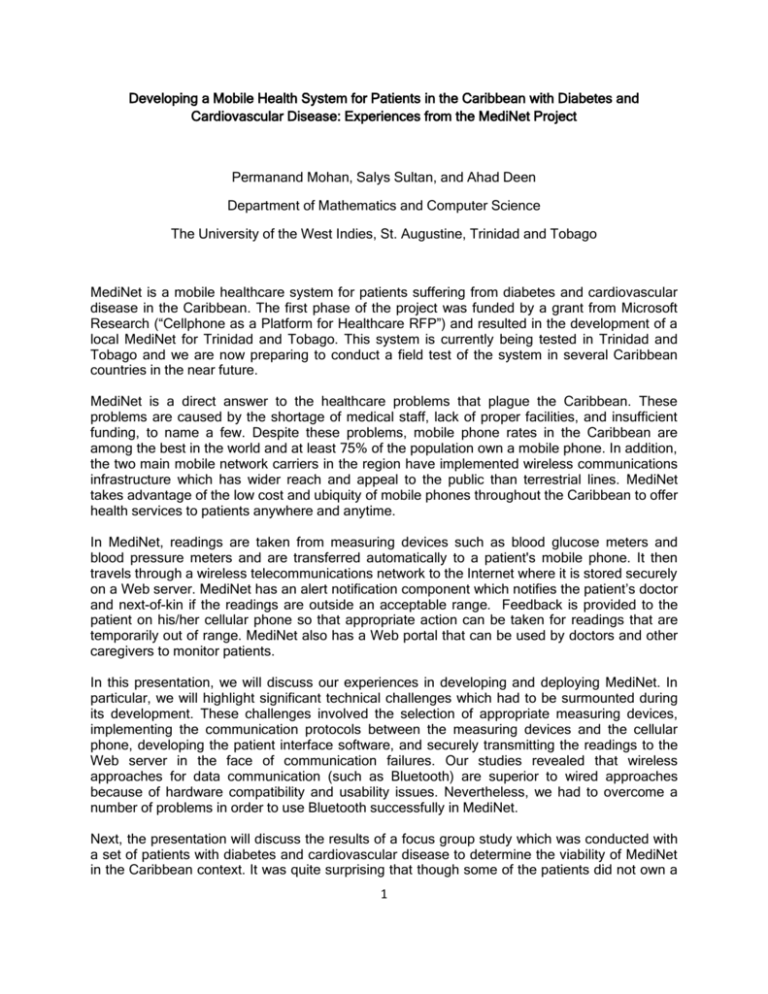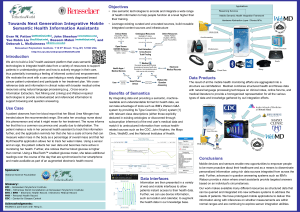Developing a Mobile Health System for Patients in the Caribbean
advertisement

Developing a Mobile Health System for Patients in the Caribbean with Diabetes and Cardiovascular Disease: Experiences from the MediNet Project Permanand Mohan, Salys Sultan, and Ahad Deen Department of Mathematics and Computer Science The University of the West Indies, St. Augustine, Trinidad and Tobago MediNet is a mobile healthcare system for patients suffering from diabetes and cardiovascular disease in the Caribbean. The first phase of the project was funded by a grant from Microsoft Research (“Cellphone as a Platform for Healthcare RFP”) and resulted in the development of a local MediNet for Trinidad and Tobago. This system is currently being tested in Trinidad and Tobago and we are now preparing to conduct a field test of the system in several Caribbean countries in the near future. MediNet is a direct answer to the healthcare problems that plague the Caribbean. These problems are caused by the shortage of medical staff, lack of proper facilities, and insufficient funding, to name a few. Despite these problems, mobile phone rates in the Caribbean are among the best in the world and at least 75% of the population own a mobile phone. In addition, the two main mobile network carriers in the region have implemented wireless communications infrastructure which has wider reach and appeal to the public than terrestrial lines. MediNet takes advantage of the low cost and ubiquity of mobile phones throughout the Caribbean to offer health services to patients anywhere and anytime. In MediNet, readings are taken from measuring devices such as blood glucose meters and blood pressure meters and are transferred automatically to a patient's mobile phone. It then travels through a wireless telecommunications network to the Internet where it is stored securely on a Web server. MediNet has an alert notification component which notifies the patient’s doctor and next-of-kin if the readings are outside an acceptable range. Feedback is provided to the patient on his/her cellular phone so that appropriate action can be taken for readings that are temporarily out of range. MediNet also has a Web portal that can be used by doctors and other caregivers to monitor patients. In this presentation, we will discuss our experiences in developing and deploying MediNet. In particular, we will highlight significant technical challenges which had to be surmounted during its development. These challenges involved the selection of appropriate measuring devices, implementing the communication protocols between the measuring devices and the cellular phone, developing the patient interface software, and securely transmitting the readings to the Web server in the face of communication failures. Our studies revealed that wireless approaches for data communication (such as Bluetooth) are superior to wired approaches because of hardware compatibility and usability issues. Nevertheless, we had to overcome a number of problems in order to use Bluetooth successfully in MediNet. Next, the presentation will discuss the results of a focus group study which was conducted with a set of patients with diabetes and cardiovascular disease to determine the viability of MediNet in the Caribbean context. It was quite surprising that though some of the patients did not own a 1 mobile phone, they were able to use the system with only a little training. The majority of the patients found the system useful and said they would use the system on a regular basis. Feedback from patients participating in the study was used in developing the MediNet user interface so that it would appeal to its target audience and allow patients to navigate the system with minimum data entry. The patients started using MediNet in July 2009 and the testing will run for four months. After this, patients will be interviewed to get a first-hand account of their experiences with the system and their views of MediNet as a vehicle for improving the self-management of diabetes and cardiovascular disease. Training sessions were previously conducted with the patients to get them familiar with the blood glucose meter and blood pressure meter used in MediNet as well as to familiarize them with using the software on the mobile phone. The presentation will describe our experiences in training the patients to use MediNet and present statistics showing usage of the system during the testing period. We will then discuss our intentions to use MediNet in the coming years as a platform for healthcare research in the Caribbean region. Over time, MediNet will have a considerable amount of data stored on patients and their blood glucose and blood pressure measurements. Analysing this data provides novel opportunities for improving the usefulness and value of the system to patients and their caregivers. For example, patterns may emerge of particular days when a patient’s blood glucose or blood pressure readings tend to be abnormally high or low. This information can lead to recommendations or interventions by the patient’s caregivers to improve the situation. When other diseases are eventually supported by MediNet (e.g., asthma), the information stored in the system can be analysed taking environmental, geographical, and other data into account (e.g., diet) so that the factors affecting these diseases can be better understood and controlled. Finally, we will conclude the presentation by discussing the three major next steps to take the MediNet project forward. These include extending the system to deal with other diseases afflicting the Caribbean region, conducting field tests to incorporate other Caribbean countries, and getting the system out of our research laboratory into the hands of the people of the Caribbean. While the first step is technically feasible, there a number of challenging political, social, and economic issues that have to understood and dealt with before MediNet can be established as a viable alternative to healthcare in the Caribbean region. 2 Abstract MediNet is a mobile healthcare system for patients in the Caribbean suffering from diabetes and cardiovascular disease. The first phase of the project was funded by a grant from Microsoft Research (“Cellphone as a Platform for Healthcare RFP”) and resulted in the development of a local MediNet for Trinidad and Tobago. This system is currently being tested and we are now preparing to conduct a field test of the system in several Caribbean countries in the near future. In this presentation, we will discuss our experiences in developing and deploying MediNet, highlighting significant technical challenges which had to be surmounted. Next, we will discuss the results of a study conducted with a set of patients to determine the viability of MediNet in the Caribbean context. We will then discuss our experiences in training patients to use MediNet and present statistics showing usage of the system during the testing period. Finally, we present three major next steps to take MediNet forward. 3







